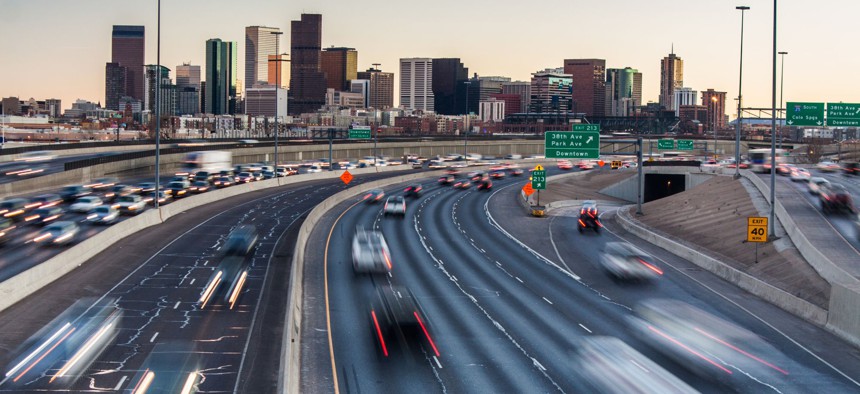U.S. Transportation Secretary Names 7 Finalists in ‘Smart City Challenge’ Competition

Interstate 25 near downtown Denver, Colorado. Paul Gana / Shutterstock.com
Anthony Foxx touts an overwhelming response to the federal competition, which will showcase the “outstanding potential to transform the future of urban transportation.”
DENVER — U.S. Transportation Secretary Anthony Foxx named seven U.S. cities, including the capitals of Colorado, Ohio and Texas, as finalists for his department’s Smart City Challenge competition on Saturday at the C3 Connected Mobility Showcase at South by Southwest in Austin.
Beyond Denver, Austin and Columbus, Foxx also named Kansas City, Missouri; Pittsburgh, Pennsylvania; Portland, Oregon; and San Francisco, California as finalists.
In June, the federal government plans to announce the winning city, which will get up to $40 million in grant to address transportation and transit challenges with integrated systems that embrace innovative technologies like self-driving cars, connected vehicles and smart sensors.
“After an overwhelming response—78 applications total—we chose to select seven finalists instead of five because of their outstanding potential to transform the future of urban transportation,” Foxx said in a statement .
The Smart City Challenge’s launch partner, Seattle-based Vulcan Inc. , has pledged an additional $10 million in funding to the winning city to support electric vehicle deployment.
With $50 million on the line, it’s no surprise that the federal competition has attracted so much attention by cities with strong innovation agendas.
Denver’s Smart City Challenge application , submitted by the City and County of Denver, the Regional Transportation District, the Colorado Department of Transportation, and the State of Colorado, focuses on the phrase “connect more with less” and three core components: Mobility on Demand Enterprise, Transportation Electrification and Intelligent Vehicles.
While Denver and its neighbors on the Colorado’s Front Range have been expanding the RDT rail network—a 22.8 mile connection between Union Station and Denver International Airport is scheduled to open next month—traffic congestion remains a difficult challenge in the growing region.
Denver’s Smart City vision includes utilizing existing technological CDOT infrastructure and the city’s existing fiber network that spans 2 million linear feet, plus an integrated data platform that’s meant to be adaptable, scalable and expanded upon.
“We want to win this, make no mistake about it,” Denver Mayor Michael Hancock said, according to KDVR-TV . “This is a big deal. I don’t want to understate that.”
It’s a big deal in the other finalist cities as well.
The Smart City Challenge can’t be “just about promoting the latest transportation and energy related technology,” according to Pittsburgh Mayor William Peduto . “It’s about applying those efforts to improve the lives of everyday Pittsburghers by building smarter transit corridors and connections, bridging the digital divide and building greater equity in city neighborhoods, realizing the value of new energy opportunities, and reaching those impacted by displacement or isolation,” the mayor said in a statement released Saturday.
Pittsburgh’s Smart City Challenge application came from a partnership between the city government and Allegheny County with Carnegie Mellon University , the University of Pittsburgh and other local stakeholders.
Pittsburgh’s application focuses on Smart City Challenge funding being used to strengthen the technological backbone along targeted corridors. According to Peduto’s announcement:
It utilizes adaptive transportation systems that evolve over time as technologies improve, and would pilot “Smart Spines” that use new sensor information and controls that gather data on major city transportation corridors.
Using that information, the city and its partners could create new uses for various modes of transportation, provide new transportation options for underserved neighborhoods, and improve safety and traveler information. The system would be designed on an open platform, which would encourage innovation by the private sector and position Pittsburgh as a testbed for future transportation technologies.
During Saturday’s announcement of the finalists, Foxx also said that Seattle-based cloud provider Amazon Web Services will provide solutions architecture and best practice assistance in a partnership with the Smart City Challenge competition.
Each of the seven finalist cities will receive $100,000 in funding to take their existing applications, which were designed as high-level overviews, and get down to the details of how they would move forward to make their visions a reality if they’re selected as the winning city.
Michael Grass is Executive Editor of Government Executive’s Route Fifty.
NEXT STORY: D.C. Metro's New General Manager: Troubled Agency Must 'Confront Some Hard Truths'






